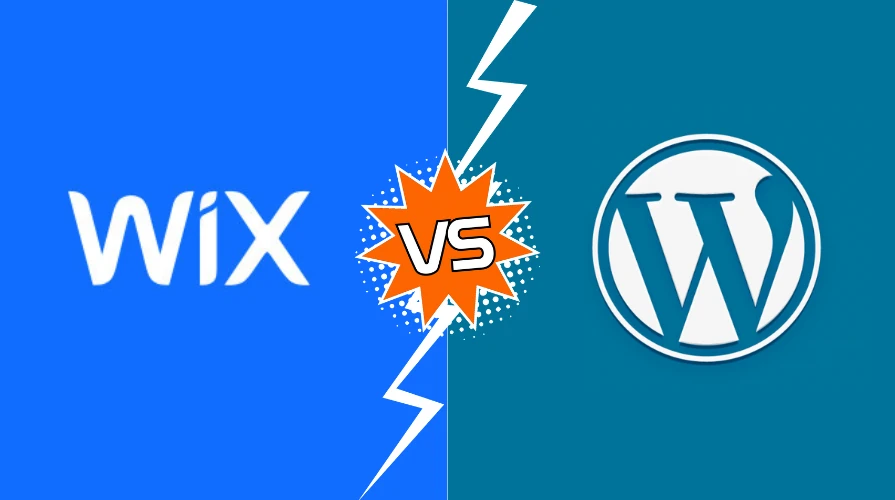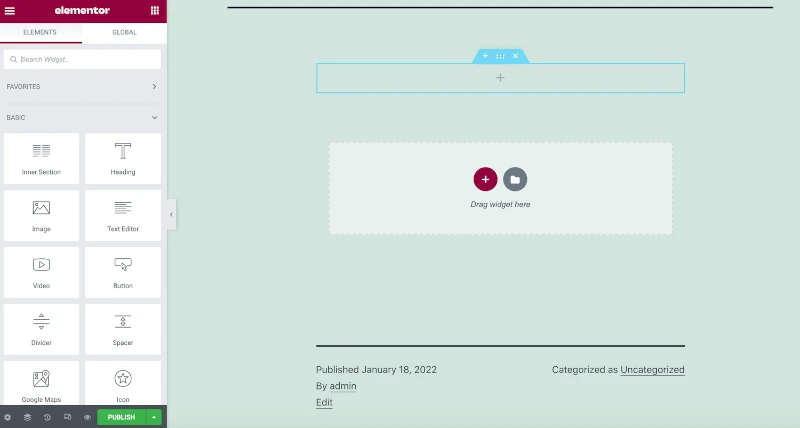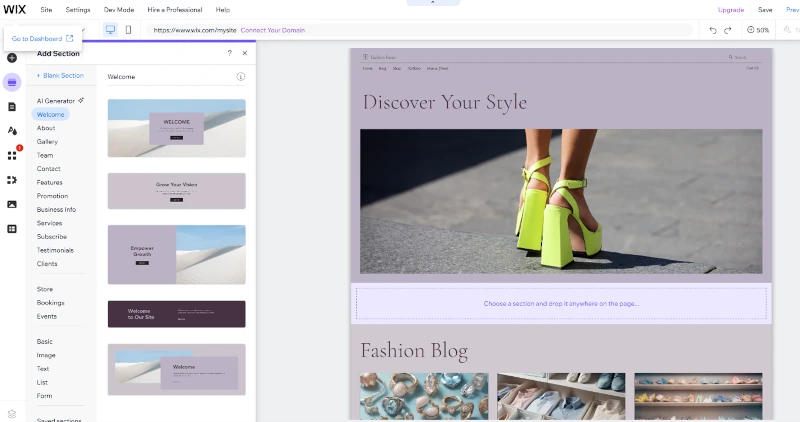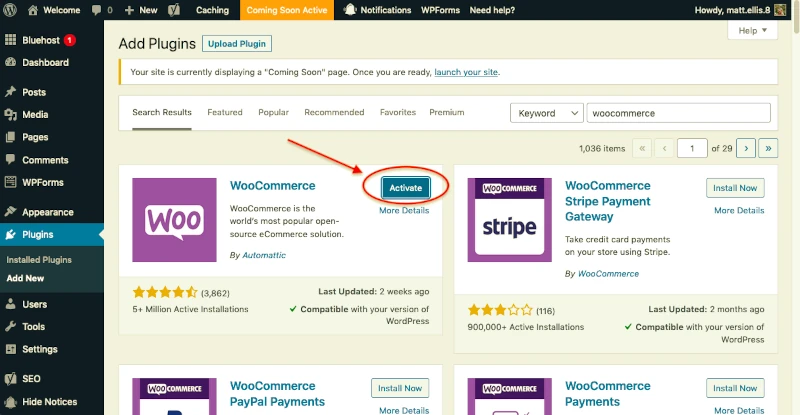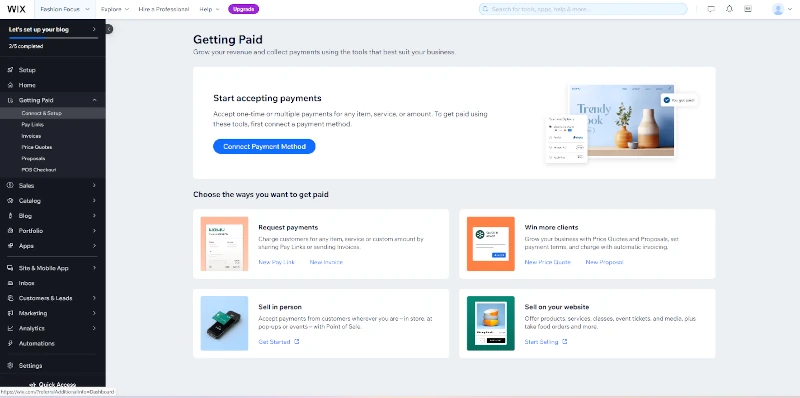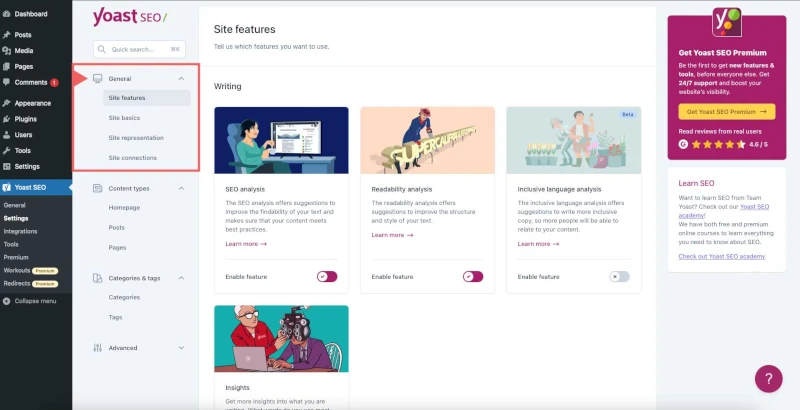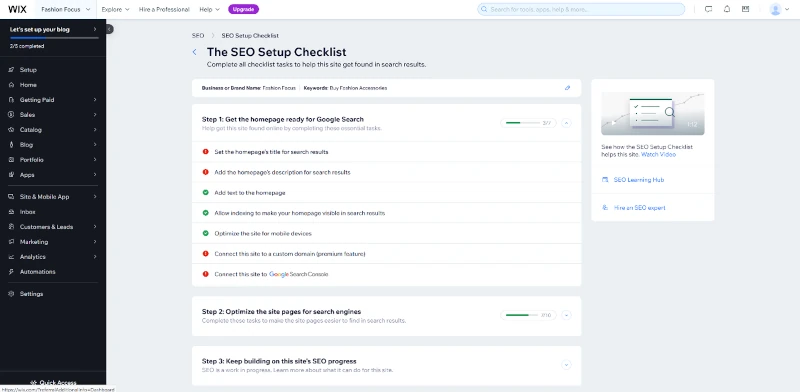WordPress vs Wix is a common question asked by those looking to build a website, whether for a personal blog, showcasing a CV or personal profile, running an e-commerce store, or any other reason.
While building a website, selecting the right platform is an important decision as it will not only impact your website but also impact your digital presence and traffic to your website. WordPress and Wix are two of the most popular modern platforms. This blog should provide an in-depth comparison of both the platforms based on different parameters. Before starting our detailed comparison, let’s have a brief introduction of both the platforms.
WordPress:
WordPress is a community-based content management system, primarily developed for publishing blogs in 2003, however, it has since evolved and is being used in the development of various websites, such as internet forums, news sites, online stores, and live streaming websites.
More than 40% of websites on the internet are powered by WordPress. The core of WordPress is written in PHP, and it comprises a plugin-based architecture and template system typically called a Theme by WordPress Developers.
Wix:
Wix provides a cloud-based web development service with customizable tools and a drag-and-drop system to create websites and mobile-responsive sites. It also offers e-commerce packages to support online stores. Wix uses Apps to integrate many features for users who need customized functionality for their website.
1. Which Platform is More User-Friendly: WordPress vs Wix
Selecting a platform that is easy to use can save you a lot of time and frustration.
WordPress
WordPress is highly flexible but comes with a steeper learning curve for beginners. Setting up a basic site with WordPress is straightforward, however, mastering its full potential often requires some expertise in web development. Its Gutenberg editor has made content management more intuitive and easier to manage, though new users might still find it challenging without initial guidance or tutorials.
Wix
Wix is famous for its user-friendly interface. Its drag-and-drop functionality allows users to create visually appealing websites without any coding knowledge. The Wix ADI (Artificial Design Intelligence) further simplifies the process by automatically creating a personalized website based on user input, making it an excellent choice for beginners or those looking for a quick setup.
Verdict: Wix wins for user-friendliness due to its intuitive interface and quick setup capabilities, making it ideal for beginners.
2. Which Platform Offers Better Design and Customization: WordPress vs Wix
The ability to customize your website’s design is essential for creating a unique online presence.
WordPress
WordPress possesses a vast repository of themes in its gallery, with over 12,000 options available in its official directory, along with thousands of themes from third-party independent sellers. These themes range from free to premium, catering to various design needs and preferences. Additionally, WordPress offers extensive customization capabilities through plugins and themes, enabling users to tweak every aspect of their site according to their preferences. Advanced users can delve into the code to create truly unique designs and features.
Wix
Wix offers a robust selection of templates, though limited to 900 only, all of which are fully customizable using its intuitive drag-and-drop editor. While it may not offer as much flexibility as WordPress in terms of backend customization, Wix still provides a wide range of design options suitable for most users. For those seeking advanced design capabilities, Wix’s Editor X offers more superior design tools.
Verdict: WordPress excels in design and customization due to its extensive theme library and deep customization options, making it suitable for those needing high flexibility.
3. Which Platform Offers Better E-Commerce Capabilities: WordPress vs Wix
If you plan to sell products or services online, the e-commerce capabilities of your chosen platform are critical.
WordPress
WordPress, when coupled with the WooCommerce plugin, transforms into a powerful e-commerce platform. Even free version of WooCommerce supports a myriad of payment gateways, and there are no additional transaction fees beyond what the payment gateway charges. This makes WordPress a preferred choice for many online stores, particularly those with specific needs or large inventories. Along with WooCommerce, there are plenty of other plugin options available to support your e-commerce business like Easy Digital Downloads, SureCart, and BigCommerce.
Wix
Wix simplifies the process of setting up an online store through its Wix Stores feature. It supports various payment methods, including its native Wix Payments system, as well as third-party integrations like PayPal and Stripe. While Wix might not offer as many e-commerce features as WooCommerce, it is sufficient for small to medium-sized businesses.
Verdict: WordPress offers superior e-commerce capabilities with WooCommerce, ideal for large or complex online stores. Wix is suitable for smaller, simpler e-commerce needs.
4. SEO: WordPress vs Wix
Effective SEO tools are essential for ensuring your website ranks well in search engine results.
WordPress
WordPress excels in SEO capabilities, particularly with the use of plugins like Yoast SEO, All in One SEO, and many others. These tools provide detailed insights and recommendations to optimize your content for search engines. WordPress’s inherent ability to handle semantic markup and customizable URLs further enhances its SEO potential.
Wix
Wix has made notable progress in enhancing its SEO capabilities. It offers built-in SEO tools and guides to help users optimize their sites. Integration with Google Analytics services is seamless, but Wix’s SEO capabilities are generally considered less advanced than those available with WordPress plugins.
Verdict: WordPress leads in SEO due to its powerful plugins and greater control over SEO practices.
5. Which Platform Empowers the Blogger Better: WordPress vs Wix
For many users, blogging is a key component of their website.
WordPress
Originally designed as a blogging platform, WordPress remains a pioneer for bloggers. It offers a wide range of blogging tools, including categories, tags, and a versatile editor for creating rich content. The Gutenberg editor enhances the blogging experience with its block-based approach, allowing for greater flexibility in content layout.
Wix
Wix supports blogging, though its features are more basic compared to WordPress. It provides essential blogging tools, but users might find the formatting options and comment management less robust. Wix is suitable for casual bloggers but may not meet the needs of more dedicated content creators.
Verdict: WordPress is the superior choice for blogging due to its extensive features and flexibility.
6. Custom Code and Development: WordPress vs Wix
The ability to customize your website with code can be crucial for advanced users.
WordPress
WordPress is highly favored by developers due to its open-source nature. Users with coding knowledge can customize their websites extensively using HTML, CSS, JavaScript, and PHP. This flexibility makes WordPress a powerful platform for creating highly customized websites.
Wix
While Wix is not as flexible as WordPress in terms of custom coding, it does offer Velo by Wix (formerly Corvid), a development platform that allows for advanced customizations using JavaScript. This makes it possible to add custom functionalities and integrations, though it still doesn’t match the level of customization available with WordPress.
Verdict: WordPress is better suited for developers due to its open-source nature and extensive customization capabilities.
7. Pricing for Better Value for Money: WordPress vs Wix
Cost is a significant factor when choosing a website platform.
WordPress
WordPress itself is free to use, but there are costs associated with hosting, domain registration, and premium themes/plugins. This can make WordPress either a cost-effective or expensive option, depending on the services you choose. There are several WordPress managed hosting options available at a very reasonable cost.
Wix
Wix offers a range of pricing plans, starting with a free plan that includes Wix branding. To remove ads and unlock more features, users need to subscribe to one of the premium plans. These plans include hosting, which simplifies the setup process but might end up being more expensive in the long run compared to WordPress.
Verdict: WordPress can be more cost-effective in the long term, especially for larger sites, while Wix offers simpler, all-inclusive plans suitable for smaller projects.
8. Data Portability and Control: WordPress vs Wix
Having control over your data and the ability to move it is essential for long-term flexibility.
WordPress
One of WordPress’s significant advantages is data portability. Users have full control over their data and can easily export content, making it simple to migrate to another hosting provider or platform if needed.
Wix
Wix offers limited data portability, which can be a drawback for users looking to move their site to another platform. While it is possible to export certain content, full migration can be challenging, making users more dependent on Wix’s ecosystem.
Verdict: WordPress offers superior data portability and control, providing greater long-term flexibility.
9. Security: WordPress vs Wix
Website security is a top priority for all site owners.
WordPress
WordPress is generally secure, but its popularity makes it a target for hackers. Security largely depends on the hosting provider and the user’s diligence in keeping themes, plugins, and WordPress itself updated. Many security plugins like Wordfence Security and Sucuri Security offer features like login limits and user log tracking to enhance your site’s security and protection.
Wix
Wix handles all security measures for its users, providing SSL certificates, automatic updates, and protection against common threats. This makes Wix a secure choice without requiring additional effort from the user.
Verdict: Wix offers a more straightforward approach to security, handling most aspects automatically, while WordPress requires more user involvement but offers more control.
10. Customer Support: WordPress vs Wix
Access to reliable customer support can be fundamental, mainly for beginners.
WordPress
Support for WordPress comes from its large community and a multitude of online resources, including forums, tutorials, and documentation. While this is extensive, direct support depends on your hosting provider or premium support services you may purchase.
Wix
Wix offers dedicated customer support through various channels, including phone, email, and live chat. Premium plans come with priority support, making it easier to get help when needed.
Verdict: Wix excels in customer support with its dedicated channels and priority support for premium users.
11. Which Platform Provides More Extensions: WordPress vs Wix
Plugins and apps enhance the functionality of your website.
WordPress
WordPress’s extensive plugin directory, with over 59,000 plugins, allows users to add virtually any functionality to their site. This vast ecosystem of plugins ensures that users can find tools to meet their specific needs, from SEO optimization to e-commerce and beyond.
Wix
Wix also has a robust app market with numerous integrations and add-ons. While not as extensive as WordPress’s plugin directory, the Wix App Market provides a wide range of options to enhance website functionality.
Verdict: WordPress offers a more extensive range of plugins and apps, catering to a broader set of functionalities and customizations.
Results
After thoroughly comparing WordPress and Wix across various dimensions, it is clear that both platforms offer significant strengths tailored to different user needs.
- WordPress is ideal for users who need extensive control, flexibility, and scalability. It is suited for those who are comfortable with a learning curve and have some technical knowledge or have a budget to hire a professional web development service.
- Wix is perfect for beginners or those looking for a quick, easy setup with strong customer support. It offers an intuitive interface and excellent design tools, making it a great choice for small businesses and personal websites.
Conclusion
Both WordPress and Wix have their unique strengths and weaknesses. WordPress offers unparalleled flexibility and customization, making it ideal for users who need extensive control and scalability. Wix, on the other hand, provides a more user-friendly experience, making it perfect for beginners or those looking for a quick and easy setup. Ultimately, the choice between WordPress and Wix depends on your specific needs, technical skills, and long-term goals.

